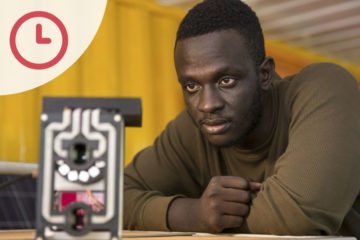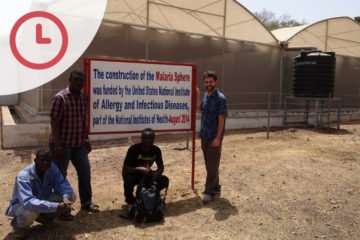Podcast Available on iTunes and Spotify.
Welcome back.
Joining me today is Rob Mather, the CEO of The Against Malaria Foundation (AMF). Earlier this year, he was presented with a Points of Light certificate by Prince William, signed by Her Majesty the Queen.
AMF fund anti-malaria nets, specifically long-lasting insecticidal nets, LLINs.
Rob Mather, thanks for joining me.
No problem.
How much does it cost you to buy and distribute one mosquito net?
US$2, which is about £1.50, and then on top of that it’s another $1.50 for “non-net costs” – shipping, transport of the nets and household by household registration across the entire distribution area, so we know exactly how many nets each individual household needs to ensure everyone is protected. So, the total distributed net cost is about US$3.50, or about £2.50.
Now presumably you will not have a correct amount of funding to be able to distribute mosquito nets to everyone that needs one. So how do you prioritise who to give nets to?
It’s a good question. There is a very significant gap in funding. We do have to prioritise, and we focus on countries and regions with very high levels of malaria. Those tend to be in sub-Saharan Africa, where 90% of the death burden falls. To ensure everyone is covered in a distribution area, we make sure we fund enough nets so that no one misses out. Currently, ae don’t have enough funds to cover all the nets requested of us, so we often have difficult decisions to make. We either reduce the number of nets we will fund for a particular country or let countries know we don’t have the funding.
And corruption can be a big problem in the foreign aid sector. How can you ensure that 100% of all the money given to you is going towards the distribution of mosquito nets?
Yes, you’re right, corruption can be a big problem and that has to be acknowledged. If you’re aware of it, you can do something about it. When it comes to foreign aid, it’s very important to manage and monitor programs carefully. In our case, we have a low risk for several reasons. First, when we buy nets, manufacturers (largely in Asia) directly, so those funds are easy and simple to track. Secondly, our net distributions are surrounded by data at a very granular level, the household, so we can monitor closely that the nets we fund go in the right quantities to the people who need them.
And where does your money come from? Is the UK government or governments overseas, or do you rely solely on donations from the public?
We are funded solely by donations from the public and we use 100% of the money we receive to buy long-lasting insecticidal nets. So, if AMF receives £100 we will buy £100 of, or about 65, nets with 100% of that money.
Rob Mather, thank you.
Thanks, Thomas, take care.
Rob Mather of the Against Malaria Foundation.


